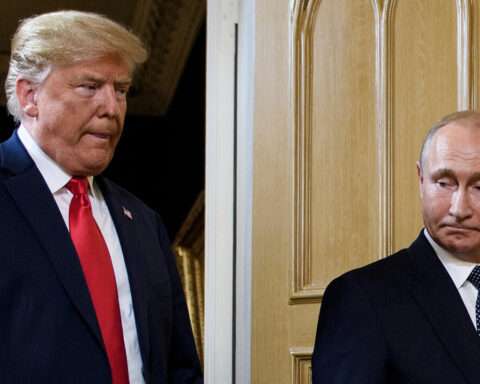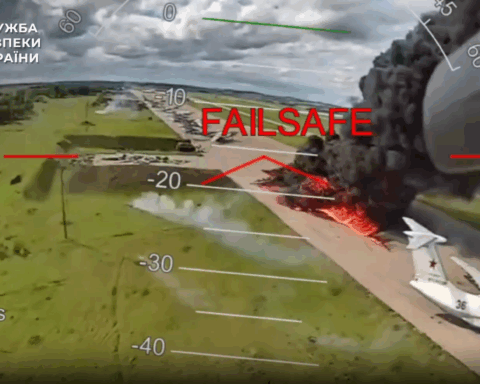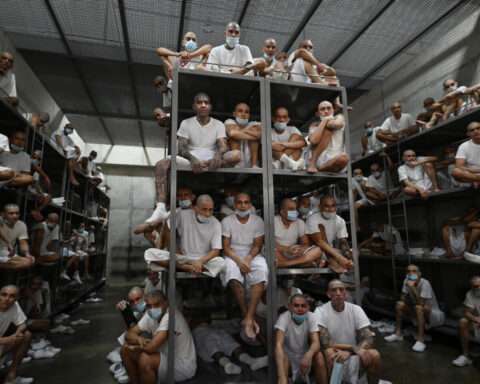WASHINGTON — “The United States remains firmly committed to Ukraine’s sovereignty and territorial integrity in the face of Russian aggression and our support for Ukraine’s Euro-Atlantic aspirations,” Biden told the Ukrainian president in the Oval Office on September 1.
“The partnership between our nations grows stronger, and it’s going to even become stronger than it has been,” he added.

However, he did not give the Ukrainian president a clear path toward NATO membership, nor an indication his administration would get directly involved in peace talks to help end a seven-year war with Russia-backed separatists in eastern Ukraine.
Zelenskiy arrived at the White House saying he had a “very big agenda” to discuss, with a focus on security and Ukraine’s ambitions to join the NATO alliance.
“I would like to discuss with President Biden his vision, his government’s vision, of Ukraine’s chances to join NATO and the time frame,” he said.
But Biden has made it clear he considers Ukraine far from ready to join the alliance, with the country still in need of vast reforms and Russia strongly opposing the prospect of NATO membership.
Instead, Biden appeared ready to press Zelenskiy to tackle corruption and carry out badly needed reforms.
“We’re going to discuss how the U.S. can continue to support Ukraine as it advances its democratic reforms agenda and movement toward being completely integrated in Europe,” Biden said.
Russia took control of Crimea from Ukraine in March 2014 after staging a referendum dismissed as illegal by at least 100 countries. Moscow also backs separatists in a war against government forces that has killed more than 13,200 people in eastern Ukraine since April 2014, although it has consistently denied any role in the fighting.
Zelenskiy has said he would like the United States to get involved in stalled peace talks. The main partners in that effort include France and Germany, along with Ukraine and Russia, but some Ukrainian officials are skeptical of the support received from Berlin and Paris and have pushed for more involvement by Washington to breathe life into the peace process.
The United States created the position of special envoy for peace talks, but that role has been left unfilled since September 2019. The Biden administration is not expected to fill the position, a U.S. State Department official told RFE/RL ahead of the meeting.
Zelenskiy won an election in 2019 on a platform of trying to end the war in eastern Ukraine, tackling the country’s notorious deep-seated corruption, including the undue influence of powerful businessmen known as oligarchs, and cleaning up the country’s court system.
Though Zelenskiy has moved to target some powerful business interests, especially those with Russian ties, the reform effort is seen as sputtering and Western donors have grown impatient.
During the White House meeting, Zelenskiy was also expected to seek greater U.S. military aid, including help rebuilding Ukraine’s navy. Russia took control of a large share of Ukraine’s naval forces when it seized Crimea.
Ahead of Zelenskiy’s meeting with Biden, the United States announced it would release a $60 million tranche of military aid for Kyiv. The new package, which includes more sophisticated anti-tank missiles, comes on top of the $400 million in annual spending that Washington provides Ukraine. Washington says it has provided more than $2.5 billion to Ukraine since 2014.
“Russia’s buildup along the Ukrainian border has highlighted capability shortfalls in the Ukrainian military’s ability to defend against a Russian incursion,” the White House said in a statement accompanying the announcement.
“Ukraine’s significant capability gaps must be urgently addressed to reinforce deterrence in light of the current Russian threat,” it added.
“The United States is our strategic partner and a supporter of our sovereignty and our territorial integrity,” Zelenskiy said at the start of the meeting with Biden.
He thanked Biden for the additional military aid, as well as more than 2 million COVID-19 vaccines.
Zelenskiy had said earlier this week that Ukraine needs “not just words” but action from the West to help deter Russian aggression and end a conflict that has raged for seven years.
During his meeting with Biden, Zelenskiy was expected to raise Washington’s decision not to block construction of the Nord Stream 2 natural gas pipeline that is set to bring Russian gas to Germany under the Baltic Sea, bypassing Ukraine.
Critics of the pipeline project — which is nearly completed — argue it will strengthen Moscow’s energy hold on Europe and cut Ukraine off from lucrative gas-transit fees, amounting to billions of dollars annually.
Zelenskiy has described the new pipeline as a powerful geopolitical weapon. Following his one-on-one with Biden, Zelenskiy met with members of the Congressional Ukraine Caucus, who strongly oppose Nord Stream 2.
The Oval Office visit is the culmination of a multiyear effort by the Zelenskiy administration to secure the meeting, an effort in large part intended to send a message to Moscow that Washington firmly supports Kyiv.
Shortly after Biden won election in November, Zelenskiy expressed optimism that the new administration would be a better fit for his country than his predecessor, Donald Trump.
Trump accused Kyiv of interfering in the 2016 election on behalf of his opponent, former Secretary of State Hillary Clinton. He also pressured Zelenskiy in 2019 to dig up dirt on Biden and the work of his son Hunter in Kyiv, triggering an impeachment trial that all but brought bilateral relations to a standstill for the rest of Trump’s term.
Under Trump, the United States did keep a range of Ukraine-related sanctions measures, targeting Moscow, in place; the Trump administration also finally authorized the delivery of Javelin anti-tank missiles — something that President Barack Obama had declined to do, fearing it would antagonize Moscow.






